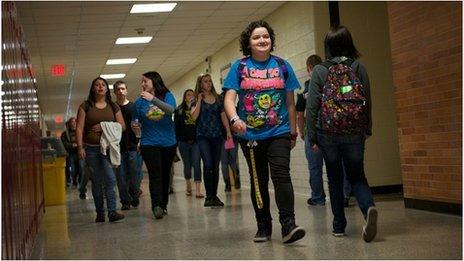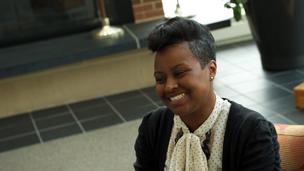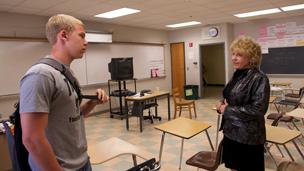Levittown at school: Life and debt in a gloomy economy
- Published

<bold>America's student debt has reached $1tn, and interest on college loan repayments is scheduled to double on 1 July unless Congress acts. In the latest of our series on Levittown, Pennsylvania, we look at how today's students are facing challenges older generation</bold> <bold>s</bold> <bold> never did.</bold>
When Eileen Hoffman was eight years old, she was Levittown's future.
Brought to live in the sparkling new town by her parents, the young girl marvelled at the sight of grass, at the open spaces, at the fresh air.
Eileen was an ambitious girl with ambitious parents. They saw Levittown, founded in 1952 just months before their daughter was born, as a path out of hard-scrabble Philadelphia.
One of her earliest memories was the spine-tingling day when then-Senator John F Kennedy put Levittown on the map in 1960 with a presidential campaign stop in the town shopping centre.
"The idea was that you could do anything you wanted to do," she recalls today. "Your children could do anything they wanted. They could surpass their wildest dreams."
And Eileen did just that. From little Levittown, Pennsylvania, she took her inquiring mind to a succession of ever-grander seats of learning: Long Island University, NYU, the University of Madrid.
Yet she never forgot Levittown, and when she finished her studies she returned home, she became Eileen Shine.
She returned to her true alma mater, her high school, dedicating her career to improving the chances of those who came after her.
Today - among other responsibilities - Mrs Shine manages Harry S Truman High School's roster of elite examination candidates.
These able students are capable of tackling four-year courses at universities that charge as much as $50,000 (£30,820) per year.
Brandishing the list, she points to the names marked in red. Every one - about half the list - qualifies for free school meals. In US education, that is shorthand for poor.
It is one of the starkest differences with the Levittown of years gone by, says Palmer Toto, the school's head of guidance.
Where families once worked to save for a college fund, today they work to pay the mortgage. There is little or nothing left over.
'Disintegrating families'

Latoya Livingstone's enthusiasm for Levittown could be cut straight from a sales brochure
The locker-lined halls of Truman High are as much of a throwback to the era of the American Dream as is the name of the school.
There is a football stadium, a baseball diamond and an 800-seat theatre. The senior prom is coming up this month.
There are also plenty of students who seem infused with the same ambition that drove a young Eileen Hoffman.
While Eileen could be certain that her parents' endeavour would set her up to achieve her goals, there is less certainty for today's graduating class.
"I'm going to be the first in my family to go to college," says Megan Cannon, 17, who has secured financial assistance to study at Pennsylvania's Lockhaven University.
Nevertheless, Megan works two jobs as well as studying for her high school diploma. Her mother, who runs her home alone, also has two jobs - as a bartender and as a bus driver.
"I've seen how my mom has lived and I want to have as much as I can," Megan says. "I want to make my mother proud."
Mr Toto, a former English teacher who returned to Levittown's only high school after 21 years in private business, says Megan's situation is very typical of Levittown in 2012.
"The family unit is disintegrating," he says. "And there is no money. Our youngsters are having to choose community college whereas before they chose a four-year degree."
The average yearly tuition cost in 2009-10 reached $12,804 at publicly funded colleges and $32,184 at private institutions, <link> <caption>according to the US Department of Education.</caption> <url href="http://nces.ed.gov/fastfacts/display.asp?id=76" platform="highweb"/> </link>

Lou Volpe says: "They will never give up, these kids, they will find a way to prevail"
At about $3,500 per year for two years, community college is an affordable option. Students who complete two years are then eligible to transfer to a bachelor's degree-awarding institution.
Even then the costs for those final two years could be prohibitive. America's total student debt burden last week topped $1tn - more than the total of the entire US credit card debt - and it shows no sign of easing.
Joining the US military is another possibility, and recruiting leaflets for the US Marines are placed prominently in the school guidance office.
Ashley Fuences chose to join the Marines, she says, "because there wasn't enough money going around the house".
Jon Earp-Kitens has opted for a military academy that will see his tuition fully paid, in exchange for five years of service.
He sounds confused, through, by some of the contradictions of the modern American economy.
"People say that if you don't go to college that you're not going to be anything," he says. "But a lot of people who do great at college don't get jobs anyway."
"My dad said he used to work in the old US Steel plant and he got paid good money. But now that kind of work makes you nothing."
Today, Jon adds, his father doesn't earn much either. Most of his recent work as a telecoms contractor was taken by a graduate - brought in from overseas.
'Pioneer stock'

Some Truman students - even girls - aim to join the military when college is not an option
If Truman's halls echo traditions of an older America, nearby Bucks County Community College sparkles like a newer model.
Just outside the borders of Levittown, the gleaming, five-year-old Lower Bucks Campus replaces concrete corridors with glass-roofed atriums and low-energy lighting.
With its modest fees and broad range of courses, it is a haven for students like Latoya Livingstone, 20, whose family moved to Levittown in 2007.
A 2010 graduate of Truman High, Ms Livingstone chose Bucks for the same reason many of the 2012 class will - its affordability.
Despite the college's lack of glamour and history, she is practical and committed to her studies.
"We are going to want families eventually," she says. "People like us, we need education. I'm pretty sure I'm not going to get a well-paid job without an education behind me."
Her rhetoric is not as lofty as Elaine Hoffman's 1960s idealism, but her enthusiasm for Levittown could be cut straight from a 1950s sales brochure.
"We wanted a house," Latoya says, recalling why her parents moved five years ago to become the only black family in the town's Red Cedars area.
"And I love it. I have my own room - I didn't have my own room growing up. We have so much space. And we have a dog!"
At Truman High, veteran English teacher Lou Volpe has his own explanation for why at least some of the town's students keep on plugging away.
"Kids from Levittown are survivors," says Mr Volpe. "They don't come from privilege. They are pioneer stock."

Mrs Shine, seen here with Jon Earp-Kitens, recalls the joyous optimism of her childhood in Levittown
In his own way Mr Volpe is a pioneer, too. He built a nationally renowned theatre programme during 43 years of teaching in a blue-collar former steel town.
Under his stewardship the school has premiered amateur productions of Les Miserables and Rent, and received a gala visit from British impresario Sir Cameron Mackintosh.
His admiration for the young people of Levittown is undimmed by mundane matters like economic gloom.
"They will never give up, these kids, they will find a way to prevail.
"The American Dream is still possible. It's here in Levittown; it's flourishing. It's why I've stayed."